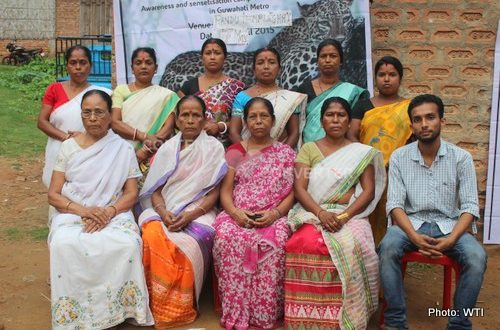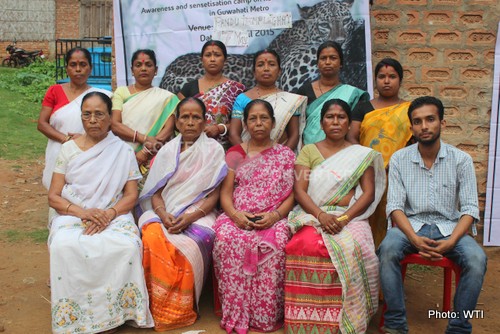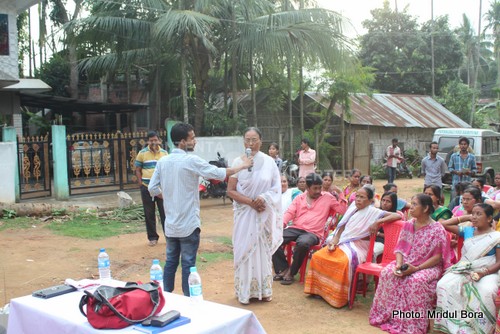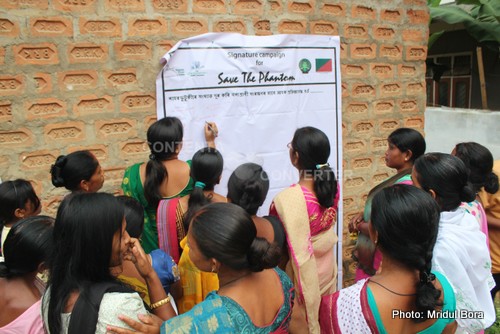Empowering Women for Mitigating Human-Leopard Conflict in Guwahati
“If you want something said, ask a man; if you want something done, ask a woman.”
–Margaret Thatcher
Guwahati, June 26, 2015: Harbingers of change, the contribution of women has often been neglected and labels such as weaker sex have by and large prevented them from entering into territories that are considered to be male bastions. Defying these stereotypes, Wildlife Trust of India is carrying out a unique experiment in and around Guwahati in Assam wherein women have volunteered to mitigate human-leopard conflict that in popular perception is widely believed to be way out of their comfort zones. This is the first time that an all women’s volunteer group has been constituted to address this crisis.
Popularly known as the gateway to the northeast of India, Guwahati is the biggest cosmopolitan city in the region. Surrounded by wilderness, this city has been expanding at a very fast pace with development taking a toll on the forests surrounding it. With such fast paced developmental activities, instances of human-wildlife conflict cases have seen a sharp spike in the last decade or so. Of these conflict cases, the ones involving leopards have seen a dramatic rise in recent years. In the last six years, there have been 54 cases of human-leopard conflict in Guwahati alone which led to one human and four leopard deaths.
These conflict cases have led to an increasing hostility towards leopards making them victims of human ire. To address this hostility and find a solution for co-existence, Mridul Bora, a young researcher from Guwahati University proposed a project, ‘Human leopard conflict mitigation through community participation in Guwahati’. WTI and David Shepherd Wildlife Foundation (DSWF) provided support to this proposal through a Rapid Action Project (RAP).
Since then, Mridul Bora has been conducting awareness camps in and around the city. On May 17, 2015, during the course of an awareness programme in Maligaon, the team requested for volunteers for a primary response team. A group of women expressed their willingness to be a part of this team which was welcomed by WTI leading to the creation of a first ever women volunteer team in Assam for human wildlife conflict mitigation.
Radha Rani Dutta was chosen as the first president of this team comprising of 13 women. An activist, she has been part of other campaigns in the past, but it is for the first time that she is engaged in wildlife related activity.
“Last year a school boy was injured by a leopard and I carried him to the hospital and even spoke to a ward member for compensation. But the boy didn’t get any compensation and I was livid. I also called the Assam State Zoo for help when another leopard entered in our locality last year, but no one intervened. When Mridul Bora started his awareness campaign, I realised that we need to act to find solutions for our own problems and agreed to be a part of this group,” Ms Dutta said.
All the members of the team are housewives and spend most of their time at home looking after their families. These women are from Pandu, a locality in Guwahati, which has the highest conflict with leopards and every member has seen leopards since childhood.
On the question of whether such a team would be successful in averting crisis during man animal conflict, Runu Das, one of the members of the team, said, “We have been organising meetings about women empowerment and telling women that men and women are equals. I believe that women can handle conflict situations better than men.” Ms Dutta, added, “When a leopard enters in our locality, we have to face it. If we know what to do, we can easily manage the situation. Moreover, children are closer to their mother then their father. So we can easily teach them about wildlife conservation and environment protection.”
In the beginning, some of the women were hesitant of joining the group because of family compulsions, but after Mridul Bora and some women paid visit to the families, it became relatively easier. “I have been actively involved in various social programs in our locality, I feel very great when I work for the good of the community. But, sometimes we need to think about what our families have to say. In the awareness camp, I was present but didn’t raise my hand to vulnteer, because my husband was not comfortable with it. One week later, when Siwani Das and Mridul Bora came to my residence and described why they need me. After that my husband not only gave me permission, he also said that he will look after the family when I am out for such work,” said a jovial Dipali Das.
It took many visits by Mridul and other volunteers to convince the rest of the women and their families to join for this cause. “Even the family members were proud of what their wives/sisters/daughters/mothers were doing,” said Radhika Bhagat, Head, Wild Aid. She added, “Our objective is to sensitize every section of the society and popularize environment education and this women’s volunteer team can lead us to our goal.” Apart from the formulation of the volunteer squad, WTI have taken up the task to sensitize the affected community so they understand the reasons for conflict and also know the protocols to follow when faced with such a situation. The media also been roped in so that they ensure the issue is not sensationalized in a manner that makes the leopards appear as the “villain”.
One of WTI’s oldest initiatives, RAP was activated to enable quick response to wildlife emergencies across the country. Through the RAPs, WTI extends support to individuals or grassroots organisations with proven credibility, and works closely with the government to implement short and medium-term interventions to address urgent or critical conservation needs across the country. Over the past 17 years, this division has sanctioned and conducted more than 350 diverse kinds of species-specific or general projects across 26 states and two Union territories in India.












